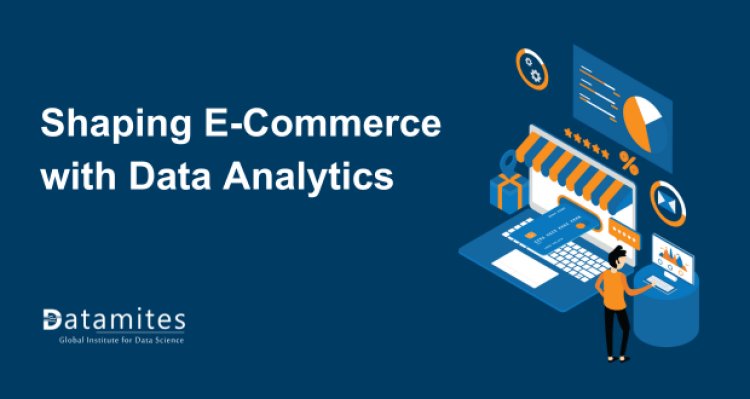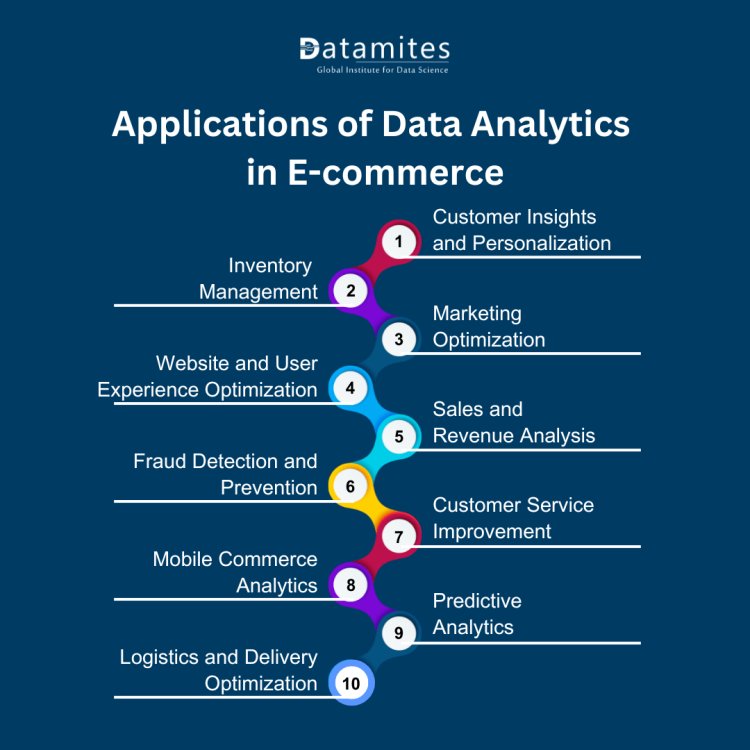How Data Analytics is Shaping the Future of E-commerce

In the rapidly evolving landscape of e-commerce, data has become the lifeblood of successful businesses. As consumer behavior shifts, the ability to harness and analyze vast amounts of data has emerged as a crucial factor in driving growth and enhancing customer satisfaction. According to recent statistics, global e-commerce sales are expected to surpass $6 trillion by 2024. This explosive growth has sparked a significant demand for data analytics, with businesses increasingly recognizing its value in understanding market trends, consumer preferences, and operational efficiencies.
Moreover, the ongoing digital transformation in retail has accelerated the need for robust data analytics. A Data Analytics course can provide individuals with the skills necessary to thrive in this data-driven environment, enabling them to effectively interpret and leverage data to inform business decisions. With a focus on real-world applications, a Data Analytics certification course from a Top Data Analytics institute can equip aspiring professionals with the knowledge they need to pursue a successful career in Data Analytics.
- By 2024, E-commerce sales are expected to hit $6.3 trillion.
- Over 2.14 billion people worldwide are expected to buy goods and services online in 2024.
- Companies leveraging data analytics report a 15-20% increase in revenue.
- 94% of companies say data analytics is vital for their future growth.
These statistics highlight the undeniable link between data analytics and the evolving landscape of e-commerce. As we explore the role of data analytics in e-commerce, it's essential to understand its applications and the emerging trends shaping the industry, particularly for those considering a career in data analytics.
The Role of Data Analytics in E-commerce
Data analytics plays a pivotal role in E-commerce, allowing businesses to make informed decisions based on actual consumer behavior rather than assumptions. It involves the collection, processing, and analysis of data to uncover patterns and insights that can drive strategic initiatives. Companies that harness the power of data analytics can improve their operations, enhance customer experiences, and boost sales.
Benefits of Data Analytics in E-commerce:
- Informed Decision-Making: By analyzing data, businesses can make decisions grounded in real-world insights.
- Enhanced Customer Understanding: Data analytics enables companies to understand their customers' needs, preferences, and purchasing behaviors.
- Operational Efficiency: Analyzing operational data helps streamline processes and reduce costs.
In essence, data analytics is not merely a tool for e-commerce; it is a fundamental component that can significantly influence a company's success in the online marketplace. As the e-commerce landscape continues to evolve, the importance of data-driven strategies and comprehensive Data Analyst training will only grow.
Refer these articles:
- Essential Tools for Data Analysts
- Best Practices for Data Analysts in Data Visualization
- Data Analyst vs. Data Scientist

Applications of Data Analytics in E-commerce
Data analytics has a multitude of applications in E-commerce, significantly enhancing various aspects of the business. Below are some key areas where data analytics is making a notable impact:
1. Customer Insights and Personalization
Understanding customer behavior is vital for delivering a personalized shopping experience. Data analytics enables businesses to gather insights into customer preferences, allowing them to tailor products, services, and marketing efforts accordingly.
Key Techniques:
- Segmentation Analysis: Identifying distinct customer groups based on purchasing behavior.
- Recommendation Systems: Suggesting products to customers based on their past purchases and browsing history.
By employing data analytics for customer insights, businesses can foster loyalty and increase conversion rates.
2. Inventory Management
Efficient inventory management is crucial for E-commerce success. Data analytics helps businesses optimize stock levels, predict demand, and minimize holding costs.
Strategies for Effective Inventory Management:
- Demand Forecasting: Examining past sales data to accurately forecast future demand.
- Stock Optimization: Ensuring the right amount of stock is available to meet customer needs without overstocking.
By leveraging data analytics, companies can reduce waste, improve cash flow, and enhance customer satisfaction.
3. Marketing Optimization
Data analytics allows businesses to assess the effectiveness of their marketing campaigns. By analyzing customer engagement and conversion metrics, companies can refine their marketing strategies.
Approaches for Marketing Optimization:
- A/B Testing: Comparing two versions of a marketing campaign to determine which performs better.
- Customer Journey Mapping: Understanding how customers interact with marketing touchpoints.
Effective marketing optimization through data analytics can lead to higher return on investment (ROI) and more effective use of marketing budgets.
4. Website and User Experience Optimization
An intuitive website experience is vital for retaining customers and driving sales. Data analytics provides insights into user behavior on websites, enabling businesses to make data-driven improvements.
Techniques for Enhancing User Experience:
- Heatmaps: Visualizing where users click and scroll on a webpage to understand user behavior.
- User Feedback Analysis: Collecting and analyzing customer feedback to identify areas for improvement.
By optimizing website performance, businesses can enhance user satisfaction and increase conversion rates.
5. Sales and Revenue Analysis
Data analytics provides E-commerce businesses with the tools to analyze sales trends and revenue generation. Understanding which products perform well and identifying seasonal trends can inform inventory and marketing strategies.
Key Elements of Sales Analysis:
- Sales Dashboards: Visualizing sales data to track performance in real-time.
- Revenue Attribution Models: Determining which marketing channels contribute most to sales.
By leveraging sales and revenue analysis, companies can optimize their product offerings and marketing strategies for maximum impact.
6. Fraud Detection and Prevention
Cybersecurity is a significant concern in E-commerce, where sensitive customer data is at risk. Data analytics plays a critical role in identifying fraudulent activities and preventing data breaches.
Methods for Fraud Detection:
- Anomaly Detection:Detecting irregular patterns in transaction data that could suggest fraudulent activity.
- Real-time Monitoring: Continuously analyzing transactions for suspicious activity.
Investing in cybersecurity measures is crucial, and pursuing a Data Analytics certification course can equip professionals with the skills to effectively combat these challenges. Additionally, acquiring skills in data analytics can further enhance their ability to analyze threats and make informed decisions.
7. Customer Service Improvement
Data analytics can enhance customer service by providing insights into customer inquiries and support requests. By understanding common issues, businesses can improve their service offerings.
Strategies for Improving Customer Service:
- Sentiment Analysis: Evaluating customer feedback and reviews to assess satisfaction levels.
- Predictive Customer Service: Proactively anticipating and meeting customer needs.
Enhancing customer service through data analytics leads to improved customer retention and satisfaction.
8. Mobile Commerce Analytics
As mobile commerce continues to rise, understanding mobile user behavior becomes increasingly important. Data analytics helps businesses optimize their mobile platforms for better user experiences.
Key Areas of Focus:
- Mobile User Engagement Metrics: Analyzing app usage patterns and engagement rates.
- Mobile Conversion Optimization: Improving the mobile checkout process to reduce cart abandonment.
By prioritizing mobile commerce analytics, businesses can tap into the growing market of mobile shoppers.
9. Predictive Analytics
Predictive analytics uses historical data to forecast future trends. In E-commerce, this can help businesses make strategic decisions regarding inventory, marketing, and customer engagement.
Applications of Predictive Analytics:
- Churn Prediction:Recognizing customers who are at risk of churning and executing strategies to keep them.
- Sales Forecasting: Forecasting future sales by analyzing historical data and market trends.
By harnessing predictive analytics, E-commerce businesses can stay ahead of trends and customer needs.
10. Logistics and Delivery Optimization
Efficient logistics and delivery systems are crucial for E-commerce success. Data analytics helps businesses streamline their supply chain operations, ensuring timely deliveries and reducing costs.
Techniques for Logistics Optimization:
- Route Optimization: Utilizing data to identify the most efficient delivery routes.
- Supply Chain Analysis: Examining supply chain data to pinpoint bottlenecks and inefficiencies.
Optimizing data analytics in logistics and delivery can significantly enhance customer satisfaction and operational efficiency.
Refer these articles:
Emerging Trends in Data Analytics for E-commerce
The landscape of data analytics in E-commerce is constantly evolving. Several emerging trends are shaping how businesses approach data collection and analysis.
1. Artificial Intelligence (AI) Integration
AI is transforming data analytics by allowing businesses to swiftly analyze large volumes of data. AI algorithms can identify patterns and provide insights that traditional methods may miss.
2. Real-time Data Processing
With the increasing demand for immediate insights, real-time data processing is becoming essential. Businesses can respond quickly to market changes and customer needs by analyzing data as it comes in.
3. Voice Search and Conversational Analytics
As voice search technology advances, E-commerce businesses are leveraging conversational analytics to understand customer preferences better. This trend allows for more personalized and engaging shopping experiences.
4. Data Privacy and Compliance
With the rise of data breaches, there is an increasing focus on data privacy and compliance. E-commerce businesses must prioritize data protection and implement stringent security measures, such as those taught in a Data Analytics course.
These trends highlight the importance of staying updated with the latest developments in data analytics and Data Analytics for businesses aiming for long-term success.
Challenges in Implementing Data Analytics in E-commerce
Despite the many advantages of data analytics, several challenges can hinder its effective implementation in E-commerce.
1. Data Overload
With the vast amounts of data generated daily, businesses may struggle to identify relevant insights. Proper data management strategies are essential to sift through the noise and focus on actionable insights.
2. Skill Gaps
Many organizations face skill gaps in their workforce regarding data analytics and Data Analytics. Investing in training and education, such as Data Analytics training institutes, can help bridge this gap and enhance overall organizational capabilities.
3. Integration Issues
Integrating data analytics tools with current systems can be a complex task. Businesses must ensure seamless integration to avoid data silos and maximize the benefits of data analytics.
4. Data Security Concerns
Data breaches and cyber threats pose significant risks to E-commerce businesses. Implementing robust security measures and providing Data Analytics certification courses for employees can help mitigate these risks.
Overcoming these challenges necessitates a strategic approach, but the potential rewards are significant for businesses ready to invest in data analytics, Data Analytics, and data analyst courses.
Refer these articles:
- Data Analyst Career Scope in Bangalore
- Data Analyst Career Scope in Chennai
- Data Analyst Career Scope in Hyderabad
The Future of Data Analytics in E-commerce
The future of data analytics in E-commerce is promising. As technology advances, businesses will increasingly leverage data-driven strategies to stay competitive. Key trends shaping the future include:
- Increased Use of AI and Machine Learning: More businesses will adopt AI-driven analytics for deeper insights and automation.
- Greater Focus on Data Privacy: With growing consumer awareness, businesses will need to prioritize data protection and transparency.
- Expansion of Omnichannel Analytics: Businesses will analyze data from various channels to create a unified customer experience.
The future of E-commerce is intrinsically linked to data analytics. Companies that harness the power of data will be well-equipped to navigate the complexities of the digital marketplace, ensuring long-term success.
In summary, data analytics is revolutionizing the E-commerce landscape by enabling businesses to make informed decisions, enhance customer experiences, and optimize operations. As the industry continues to evolve, investing in data-driven strategies and Data Analytics knowledge will be crucial for success.
DataMites Institute is a leading provider of professional training in data science and analytics. Their comprehensive Data Analytics Course is designed to equip learners with essential skills for effectively interpreting and analyzing data. In collaboration with respected organizations like IABAC and NASSCOM FutureSkills, DataMites offers certifications recognized within the industry. Additionally, the institute provides a variety of programs, including Certified Data Analyst course, Artificial Intelligence, Data Science, Machine Learning, and Python Programming. Each course is meticulously tailored to meet the dynamic demands of the tech industry, enhancing career opportunities and technical proficiency.
